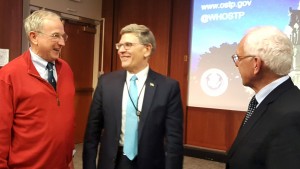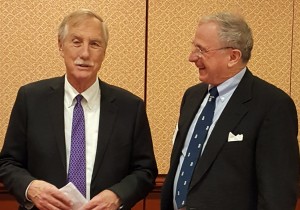Ammonite’s Skip Hobbs was in Washington December 7-10th at the Council of Scientific Society Presidents semi-annual meeting. Hobbs was president of the American Geosciences Institute in 2011, representing 250,000 earth scientists of every discipline, and is now an Alumni Member of the CSSP. He serves as the Chair of the CSSP Committee on Government and Public Affairs. CSSP member societies represent more than one million academic, industry and government scientists in the physical, biological, environmental, and agricultural sciences, and in scientific education. Skip reports that the key policy concerns of the scientific community are currently:
1. Investment in Science R&D. China and the EU now spend more money annually on government and industry funded scientific R&D than the USA. In order to preserve the nation’s leadership and remain competitive, the USA must increase investment in science R&D. There is a definite multiplier effect on the economy for every dollar spent on R&D. Science and technology equals jobs and benefits to national health, welfare and security.
Areas of scientific R&D with major future economic potential include: artificial intelligence; quantum computing; robotics; advanced materials; nanotechnology; synthetic biology; DNA printing; and technologies to reduce carbon emissions.
2. Immigration: Current visa restrictions are having a significant impact on American university undergraduate and graduate student enrollment and budgets. Thirty-four percent of PhD scientists are on temporary visas. Fully one-third of students enrolled in agricultural programs at Texas A&M University, for example, are Chinese. As foreign enrollment declines due to visa restrictions, the USA must train more of its own students as scientists, and consider increasing stipends to attract them. Nevertheless, we must have an immigration policy that encourages foreign talent to come to America to study, do research and stay in the USA. The scientific talent “pipeline” must be filled.
3. STEM Education: We must do more to encourage students to study science. Gender equality, inclusiveness, social justice, and globalization are important aspects of the education process. Scientific societies should encourage their members to talk to K-12 classes, and undergraduates to explain what scientists actually do, and how rewarding, and important a career in the sciences can be. Students need to be instructed in how to get a job in science.
4. Climate: Jobs and the economy are the major concerns of the public. Climate change is low on the list of current political issues. However, local governments are for the most part simply not prepared to deal with the impact of acute storms, floods, drought, fires, and sea level rise. What can the scientific societies do to raise public awareness about dealing with climate change, and make climate change real for voters? How can the consumer be incentivized to make changes? The cost benefits of reducing our carbon footprint and mitigating the impact of climate change, versus doing nothing, need to be clearly explained to the public. What is a sustainable path to success? Coastal states and Great Lakes science organizations are working to raise public awareness. The scientific community needs to weigh in on the reasonableness of the Green Deal time line and cost.
2019 versus 2018: Despite the perception that science is taking a back seat in the current administration, science is being done by government agencies and the science appropriations by Congress are strong. There is a slightly more positive atmosphere for science, and the public has more respect for science. Issues like increased natural hazards due to climate change, vaccines, and GMO food are science issues that have been of interest to the public. The science community is pleased that Congress has chosen to ignore the proposed cuts to science-based agencies and support modest increases in funding. We encourage further support for science funding and respect for science-based decision making. Science policy must be based on facts, not political preferences.
The President’s Science Adviser, Dr. Kelvin Droegemeier, Director of the Office of Science and Technology Policy, addressed the CSSP on December 9th about the science priorities of the Trump Administration. Skip was able to talk with Dr. Droegemeier about the concerns of the CSSP membership.

Skip Hobbs, Dr. Droegemeier of the OSTP, and Dr. John Downing of the Association for the Sciences of Limnology and Oceanography discuss science policy at the CSSP meeting December 9th.
On December 10th Skip met with Sen. Sheldon Whitehouse of Rhode Island; Senator Angus King and Senator Susan Collins of Maine; the legislative staffers on science matters for Senators Chris Murphy and Richard Blumenthal of Connecticut; and with Rep. Jim Himes of Connecticut. Hobbs is pleased to report that all of these Congressional legislators are strong supporters of science and financial support for the NSF, NIH, and the multitude of government science agencies.

Sen. Angus King and Skip Hobbs discuss science policy at a CSSP breakfast December 10th.